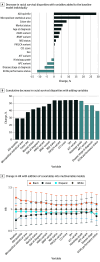Molecular, Socioeconomic, and Clinical Factors Affecting Racial and Ethnic Disparities in Colorectal Cancer Survival
- PMID: 39264607
- PMCID: PMC11393757
- DOI: 10.1001/jamaoncol.2024.3666
Molecular, Socioeconomic, and Clinical Factors Affecting Racial and Ethnic Disparities in Colorectal Cancer Survival
Abstract
Importance: Disparity in overall survival (OS) and differences in the frequency of driver gene variants by race and ethnicity have been separately observed in patients with colorectal cancer; however, how these differences contribute to survival disparity is unknown.
Objective: To quantify the association of molecular, socioeconomic, and clinical covariates with racial and ethnic disparities in overall survival among patients with colorectal cancer.
Design, setting, and participants: This single-center cohort study was conducted at a tertiary-level cancer center using relevant data on all patients diagnosed with colorectal cancer from January 1, 1973, to March 1, 2023. The relative contribution of variables to the disparity was determined using mediation analysis with sequential multivariate Cox regression models.
Main outcome: OS, from diagnosis date and from start of first-line chemotherapy.
Results: The study population of 47 178 patients (median [IQR] age, 57.0 [49-66] years; 20 465 [43.4%] females and 26 713 [56.6%] males; 3.0% Asian, 8.7% Black, 8.8% Hispanic, and 79.4% White individuals) had a median (IQR) follow-up from initial diagnosis of 124 (174) months and OS of 55 (145) months. Compared with White patients, Black patients had worse OS (hazard ratio [HR], 1.16; 95% CI, 1.09-1.24; P <.001), whereas Asian and Hispanic patients had better OS (HR, 0.66; 95% CI, 0.59-0.74; P <.001; and 0.86; 95% CI, 0.81-0.92; P <.001, respectively). When restricted to patients with metastatic disease, the greatest disparity was between Black patients compared with White patients (HR, 1.2; 95% CI, 1.06-1.37; P <.001). Evaluating changes in OS disparity over 20 years showed disparity decreasing among Asian, Hispanic, and White patients, but increasing between Black patients and White patients (HRs, 1.18; 95% CI, 1.07-1.31 for 2008-2012; 1.24, 95% CI, 1.08-1.42 for 2013-2017; and 1.50; 95% CI, 1.20-1.87 for 2018-2023). Survival outcomes for first-line chemotherapy were worse for Black patients compared with White patients (median OS, 18 vs 26 months; HR, 1.30; 95% CI, 1.01-1.70). Among 7628 patients who had clinical molecular testing, APC, KRAS, and PIK3CA showed higher variant frequency in Black patients (false discovery rate [FDR], 0.01; < 0.001; and 0.01, respectively), whereas BRAF and KIT were higher among White patients (FDR, 0.001 and 0.01). Mediation analysis identified neighborhood socioeconomic status as the greatest contributor to OS disparity (29%), followed by molecular characteristics (microsatellite instability status, KRAS variation and BRAF variation, 10%), and tumor sidedness (9%).
Conclusions: This single-center cohort study identified substantial OS disparity and differing frequencies of driver gene variations by race and ethnicity. Socioeconomic status had the largest contribution but accounted for less than one-third of the disparity, with substantial contribution from tumor molecular features. Further study of the associations of genetic ancestry and the molecular pathogenesis of colorectal cancer with chemotherapy response is needed.
Conflict of interest statement
Figures




Comment on
-
Contributions to Colorectal Cancer Disparities.JAMA Oncol. 2024 Nov 1;10(11):1530-1531. doi: 10.1001/jamaoncol.2024.3516. JAMA Oncol. 2024. PMID: 39264600 Free PMC article. No abstract available.
References
-
- Pankratz VS, Kanda D, Edwardson N, et al. Colorectal cancer survival trends in the United States from 1992 to 2018 differ among persons from five racial and ethnic groups according to stage at diagnosis: a SEER-based study. Cancer Control. 2022;29:10732748221136440. doi: 10.1177/10732748221136440 - DOI - PMC - PubMed
Publication types
MeSH terms
Grants and funding
LinkOut - more resources
Full Text Sources
Medical
Research Materials
Miscellaneous

